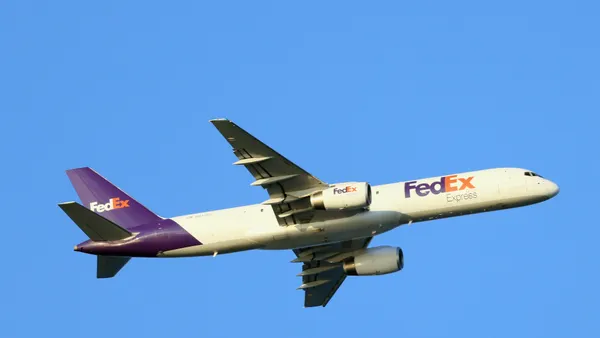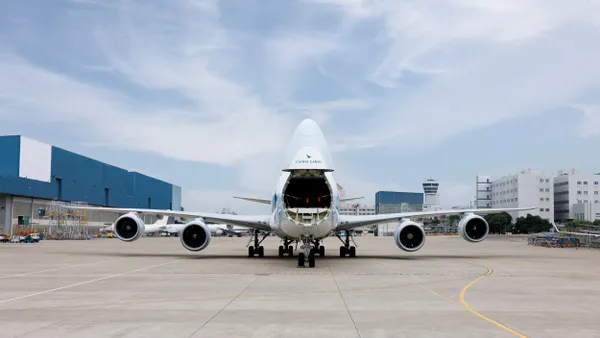Dive Brief:
- Airfreight volume fell more than 15% year-over-year (YoY) in March, according to the latest numbers from the International Air Transport Association (IATA). But with capacity falling further the industry can't keep up with what demand remains and prices for air freight are climbing as a result.
- Freight capacity fell nearly 23% YoY in March as a result of belly cargo space in passenger airlines being pulled from the market due to flight cancellations.
- International belly cargo capacity fell almost 44% YoY in March, while dedicated freighter rose more than 6% YoY. "In the short term, we don't have sufficient capacity," IATA CEO Alexandre de Juniac said in a briefing this week. "Airlines are doing whatever it takes to gain the physical capacity by taking freighters out of storage and using them more intensely. They are also adapting passenger planes to all-cargo operations."
Dive Insight:
Passenger airlines are cutting flights as a result of the coronavirus pandemic, but some are adding capacity to cargo market by repurposing planes to carry freight.
"We're taking some of the main deck seats off a few of our international planes to facilitate taking a greater lift in the short term and we'll continue to use those resources where it makes sense for certainly for some time to come," Delta Air Lines CEO Ed Bastian said on the company's earnings call last week.
As overall demand falls, carriers that specialize in airfreight are seeing increased demand for their service since so much capacity has left the market.
"International air freight tonnage rebounded in March and was up more than 15%, primarily on Asia outbound lanes as the China recovery took hold," UPS CFO Brian Newman said on the company earnings call this week.
UPS has added planes and flights to its network in an attempt to increase capacity and has moved planes around the world to get capacity where its needed, executives said on the call.
"We're having to play musical airplanes," UPS CEO David Abney said.
But IATA is calling on governments to make it easier to add capacity to the air cargo market. The organization wants governments to cut the paperwork required for charter operations, exempt air cargo crew from quarantine requirements and ensure airports are operational even if passenger flights are grounded.
"The gap must be addressed quickly because vital supplies must get to where they are needed most," de Juniac said. "For example, there is a doubling of demand for pharmaceutical shipments that are critical to this crisis. With most of the passenger fleet sitting idle, airlines are doing their best to meet demand by adding freighter services, including adapting passenger aircraft to all-cargo activity. But mounting these special operations continues to face bureaucratic hurdles."
Airlines rely on alternative airports along routes in the case of emergency, but many are not open at all times. Freight capacity relies partially on alternative airports remaining open, Glyn Hughes, IATA's global head of air cargo, said in a statement this month.
Shipping is more expensive, in the current environment, for the shippers still left on the market. Rates between China and the U.S. have increased 189% between February and April to reach $7.90 per kilogram, according to the TAC index.















